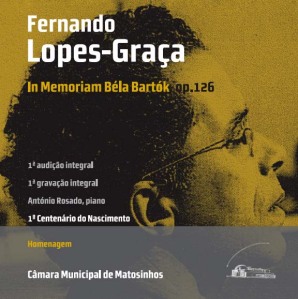NUM 1145
Title: Fernando Lopes-Graça -In Memoriam Béla-Bartók, Op. 126
Artist: Antonio Rosado
Composer: Fernando Lopes-Graça
Fernando Lopes-Graça (1906-1994)
In Memoriam Béla Bartók: 8 Progressive Suites for Piano
….
Of the great pianistic cycles of Fernando Lopes-Graça, (6 Sonatas; Glosas; 24 Preludes; Travels in My Land; Hour after Hour, Year after Year; Festive and Funeral Musics; Rustic Portuguese Melodies; Cosmorame; etc.), In Memoriam Béla Bartók: 8 Progressive Suites for Piano, LG 140 (LG: from the catalog of the composer’s estate developed by Teresa Cascudo and published by the Museum of Portuguese Music, in Cascais) remains, paradoxically, one of the most important and one of the least performed and recorded.
Lopes-Graça gave the premiere performance of suites I, II, V and VI between 1963 and 1964, and Olga Prats, the dean of the master’s great interpreters, did the same in 1971 and 1976 for numbers IV, VII, and VIII, recording the latter, in what was at that time – and has remained until the current moment – the only commercial recording available on the market. Even so, the fragmentation of the premiere of the Suites is not so surprising, since the composition of its component works extended from 1960 to 1975. The first attempt at a complete presentation was made by the Municipal Council of Matosinhos (an institution very connected to Lopes-Graça since the 1980’s; patron of the complete recording of the 6 Sonatas, as well as the current CD), which, on November 27, 1995, exactly one year after the death of the composer, brought together the pianists João Espírito Santo, Olga Prats, Miguel Borges Coelho, and Vitáli Dotsenko in the Town-hall. Unfortunately, João Espírito Santo found himself impeded from performing the 5th Suite. The current double CD is, therefore, 31 years after the composition of the final Suite, the world premiere of the complete version of one of the most fundamental works from its composer’s catalog.
The importance of In Memoriam for Lopes-Graça must have been significant, not only in terms of its temporal extension (1 hour and 40’), complexity and compositional richness, but also because the composer considered orchestrating some numbers; for example, appended in pencil on the first page of the manuscript of the 3rd Suite: “Orchestrate pastoral numbers from the suites for a Pastoral Suite (or Pastoral Hours)”. This desire was in fact begun in the 19 measures of the (undated) orchestration of Dawn (6th Suite) and Pastorale (7th Suite), both destined for an unfinished orchestral work entitled Bucolics.
The tribute to Bartók, one of the composers of reference for Lopes-Graça, if not the composer of reference, is therefore the most certain indicator of the importance which these eight suites will have assumed for him. The progressive character of the pieces is typical of a mentality with pedagogical aims, one which sees a pedagogical, musical and even ethical model in Bartók’s Mikrokosmos. By matching these suites to similar works by the influencing master, Lopes-Graça mirrors in a clear and unequivocal manner his own personal belief in the dialectical forces which impel Humanity in the direction of a – hopefully – better future. As in Bartók, pedagogy and ethics, humanism and art, inextricably link themselves in the music of Lopes-Graça.
The eight suites progress, from first to last, not only in terms of pure pianistic difficulty (problems of fingerwork), but also in terms of the complexity of the written music (which, at times resorts to the use of 3 staves simultaneously) and of esthetic richness, as well as in simply temporal terms (from the 7’ of the first suite to the 20’ of the final one). Problems of physical resistance and complex musical enigmas are added to the problems of fingerwork, issues which will only be resolved by certain interpreters, those inclined to embark on a true musical voyage.
It will be of interest, from this point of view, to observe the global form:
Total durations (partial durations written by Lopes-Graça at the end of each piece, of each suite – in the manner of Bartók):
1st Suite 7′
2nd Suite 8′
3rd Suite 12′
4th Suite 13′
5th Suite 11′
6th Suite 12′
7th Suite 14′
8th Suite 20′
.
Sorry, the comment form is closed at this time.





